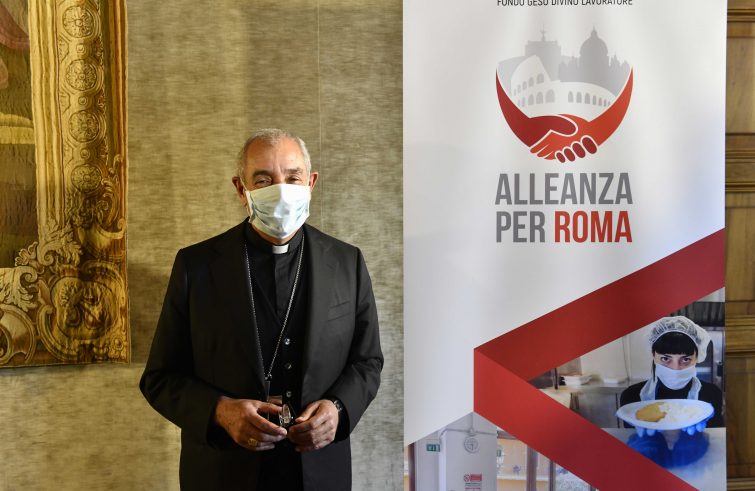
“We don’t simply wish to make a financial contribution: we want to restore dignity to those who have slipped into discouragement because they lost their jobs thinking they might never recover.” Thus Card. Angelo De Donatis, Vicar General of the Pope for the diocese of Rome, presented today, from the Lateran Palace, the Jesus the Divine Worker Fund, established by Pope Francis through his diocese to help people in economic difficulty as a result of the ongoing health crisis. At the end of the meeting, the three speakers – representing the Diocese, the Municipality of Rome and the Lazio Region – signed the Alliance Protocol for the city of Rome, which “today sees the laying of the first stone, and of which the Fund is but the first, major tool”, De Donatis pointed out: “As Christian community contributing to the Jesus the Divine Worker Fund and to the Alliance for Rome project, we hereby wish to respond to the Pope’s invitation to all the citizens of Rome, to all civil, political and economic institutions and community organizations for active and unprejudiced cooperation that may courageously contribute to overcoming the serious challenges of the present moment. Everyone can adhere.”
“To help all those struggling not to lose hope and dignity. That they may know that there is someone who supports them.”
The Mayor of Rome, Virginia Raggi, thus described the purpose of the Fund and the protocol. “In this period of economic and social crisis – the Mayor said – two tendencies have grown more extreme. The first is the tendency towards selfishness, aimed at self-preservation. However, we saw another extraordinary tendency that flourished, especially in the first phase: the tendency to help others.” For the Mayor, these are “small yet extremely valuable experiences: small entrepreneurs who have converted production, restaurant owners who devolved part of their products to those most in need, people who helped their neighbours, volunteers from the Civil Defence, the Red Cross, Caritas, parishes, associations who put aside their personal interests to help their fellow other, offering a model of solidarity and communion. The Fund and the Alliance for Rome are also an extraordinary signal in this direction”.
“The measures underway to restart the engine of development must be combined with renewed solidarity, demonstrating that we are a strong, united community, capable of responding collectively to an unprecedented crisis”.
Said the President of the Lazio Region, Nicola Zingaretti. “We cannot allow the impact of the virus to affect the values of solidarity and cohesion on which our society is based”, he remarked. “Loneliness generates fear and if it remains isolated it leads to anger. We must talk to those fears and transform them into confidence and hope.” “The Alliance for Rome will initiate a great solidarity effort for greater unity,” assured Zingaretti, citing the initiatives already implemented by the Region – including a €20 million package of measures for children and families, adopted yesterday – pointing out that those who have lost their jobs “ask to be included in a region, in a city, in a community that through work gives everyone the opportunity to get back on their feet.”
“The Fund has an initial financial allocation, requiring funding, but its strength is to involve, unite, generate new opportunities and multiply resources”,
explained Msgr. Gianpiero Palmieri, Auxiliary Bishop of the Eastern area of Rome and Delegate for Charity. The aim is “to assist and accompany a minimum of 1,000 families who have suffered serious income reduction as a result of the pandemic, who are experiencing financial difficulties and for whom the extraordinary measures adopted by the government are not accessible or not sufficient”. The first step is the disbursement of an economic contribution to overcome the emergency period, followed by the activation of apprenticeship schemes, work grants, microcredit projects. The establishment of the Fund was preceded by a series of training courses, promoted by Caritas, for 523 volunteers from the Rome parishes or associations on the subject of entitlement, to which a reply is expected. In addition, an “online” handbook on benefits entitlements has been prepared which is continuously updated by Caritas. People who wish to access the Fund are selected by 90 local counselling centres – linked to the existing ones in 337 parishes across Rome – primarily involving forms of assistance already activated by public institutions, which the most vulnerable are often unable to access due to lack of information and accompaniment. In fact the Jesus the Divine Worker Fund
“is not simply a redistribution of resources, in fact it aims to strengthen work inclusion schemes.”
Recipients of the Fund are people in great economic difficulty; they must be resident in the territory of the Municipality or diocese of Rome; have no monthly income exceeding 600 Euros; be unemployed or suffering a severe job reduction due to Covid-19; be willing to “actively cooperate in order to overcome the emergency situation.” Applications must be submitted to the Counselling Centres online, via a dedicated platform. Financial support ranges from €300 to €600 per month for families with 5 or more children, renewable for 3 months up to a maximum of 6 months depending on the availability of the Fund. Families not eligible for the Fund will be directed to other types of measures already prepared by Caritas, such as the food card, the anti-crisis Fund or the anti-usury Fund.











